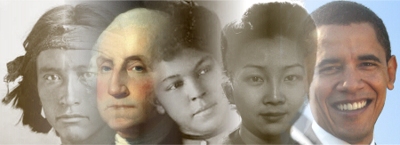Mary McLeod Bethune (1875-1955) was the preeminent black woman leader of the twentieth century. She founded Bethune-Cookman College, founded and was the first president of the National Council of Negro Women, and was a member of Franklin Delano Roosevelt's unofficial "Black Cabinet" during the New Deal era. She delivered the following speech on
NBC radio's weekly public affairs show "America's Town Meeting of the Air," November 23, 1939.
"What Does American Democracy Mean to Me?"
Democracy is for me, and for 12 million black Americans, a goal towards which our nation is marching. It is a dream and an ideal in whose ultimate realization we have a deep and abiding faith. For me, it is based on Christianity, in which we confidently entrust our destiny as a people. Under God's guidance in this great democracy, we are rising out of the darkness of slavery into the light of freedom. Here my race has been afforded [the] opportunity to advance from a people 80 percent illiterate to a people 80 percent literate; from abject poverty to the ownership and operation of a million farms and 750,000 homes; from total disfranchisement to participation in government; from the status of chattels to recognized contributors to the American culture.
As we have been extended a measure of democracy, we have brought to the nation rich gifts. We have helped to build America with our labor, strengthened it with our faith and enriched it with our song. We have given you Paul Lawrence Dunbar, Booker T. Washington, Marian Anderson and George Washington Carver. But even these are only the first fruits of a rich harvest, which will be reaped when new and wider fields are opened to us.
The democratic doors of equal opportunity have not been opened wide to Negroes. In the Deep South, Negro youth is offered only one-fifteenth of the educational opportunity of the average American child. The great masses of Negro workers are depressed and unprotected in the lowest levels of agriculture and domestic service, while the black workers in industry are barred from certain unions and generally assigned to the more laborious and poorly paid work. Their housing and living conditions are sordid and unhealthy. They live too often in terror of the lynch mob; are deprived too often of the Constitutional right of suffrage; and are humiliated too often by the denial of civil liberties. We do not believe that justice and common decency will allow these conditions to continue.
Our faith in visions of fundamental change as mutual respect and understanding between our races come in the path of spiritual awakening. Certainly there have been times when we may have delayed this mutual understanding by being slow to assume a fuller share of our national responsibility because of the denial of full equality. And yet, we have always been loyal when the ideals of American democracy have been attacked. We have given our blood in its defense-from Crispus Attucks on Boston Commons to the battlefields of France. We have fought for the democratic principles of equality under the law, equality of opportunity, equality at the ballot box, for the guarantees of life, liberty and the pursuit of happiness. We have fought to preserve one nation, conceived in liberty and dedicated to the proposition that all men are created equal. Yes, we have fought for America with all her imperfections, not so much for what she is, but for what we know she can be.
Perhaps the greatest battle is before us, the fight for a new America: fearless, free, united, morally re-armed, in which 12 million Negroes, shoulder to shoulder with their fellow Americans, will strive that this nation under God will have a new birth of freedom, and that government of the people, for the people and by the people shall not perish from the earth. This dream, this idea, this aspiration, this is what American democracy means to me.
[applause]
Return to Speeches

